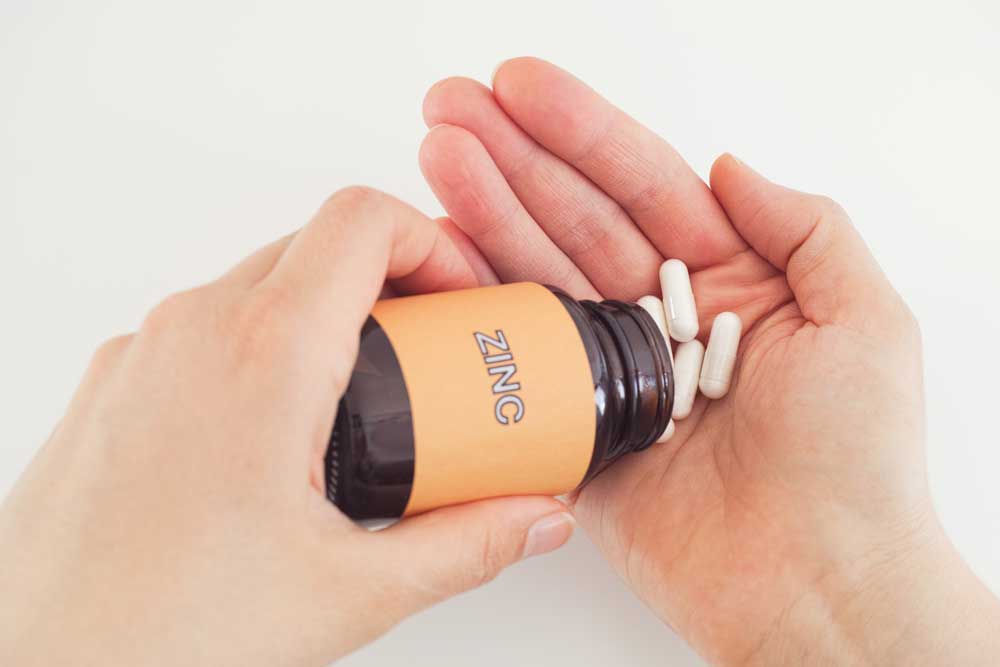Did you know that zinc possesses the amazing quality of protection? It is used in a wide range of applications – from serving as an anti-corrosive for metals like steel, to being a vital ingredient in sunscreen. Long before zinc was recognised as a separate metal by scientists, it was being used by the ancient Romans, and in India and China to make compounds for wellness. Today, this naturally found element is considered essential for human wellness and immunity building, especially in women.
Although zinc is a trace mineral that is required only in small amounts, it supports numerous functions in the body, including reproductive health, immunity, cell division, and protein production. However, the body doesn’t store zinc, so it has to be ingested through supplements or a diet with zinc-rich foods.
Who Is At Increased Risk Of Zinc Deficiency?
Dr Rachana Swapnil, a nutritionist and lifestyle coach, says, ‘Women who are pregnant, those lactating, vegans and vegetarians, are often at risk of zinc deficiency. Symptoms could include hair fall, poor wound healing, frequent infections such as colds and coughs, skin problems like acne, poor appetite, and mood swings.’
Sources Of Zinc
Zinc is widely found in both plant-based and animal-based foods. Oysters are found to contain the highest zinc content, but even if you don’t eat shellfish, you can turn to beef, chicken, pork and dairy for your zinc intake. Vegans can eat chickpeas, lentils, pumpkin seeds, sesame seeds, cashew nuts, and whole grains. However, you may need to consider supplementation with a plant-based diet.
Benefits Of Zinc
Reproductive Health: Zinc regulates hormones like estrogen and progesterone, which helps to regularise the menstrual cycle, and keep premenstrual syndrome (PMS) symptoms at bay, such as cramps, bloating, and mood swings. It also supports the ovulation process, strengthens the uterine and enhances the quality of eggs, which helps women through fertility and conception, preventing complications.
Maternal Health: Pregnant women must supplement their diet with zinc, which plays an important role in cell growth, ensuring proper fetal development and lower birth risks. It also ensures that their own bodies have adequate immunity and nutrition to cope with the changing demands of childbirth. Found in breastmilk, zinc is important for infants.
Enhanced Immunity: Zinc helps in activating the immune cells such as T-lymphocytes which prevent infections from spreading. Without enough zinc in your diet, you’re susceptible colds, respiratory illnesses, and other microbial ailments.
Antioxidant Properties: Zinc combats the production of free radicals and prevents cellular damage and oxidative stress.
Skin Health: Due to its anti-inflammatory properties, zinc is a common sunscreen ingredient, also used to treat other skin problems like eczema and acne. Zinc supports tissue repair, wound healing, and collagen synthesis.
Hair And Nail Health: Zinc aids in the production of keratin, a nutrient which is responsible for healthy hair and nails. Adding zinc to your diet can boost hair quality and strengthen nails.
Mental And Cognitive Health: Women need adequate zinc intake to prevent anxiety, enhance focus and concentration, increased cognitive function and keep neurodegenerative ailments like Alzheimer’s at bay.

How Much Zinc Should Women Consume?
Dr Rachana says, ‘Consult your doctor before deciding on zinc supplements. Women aged 18 and above should aim for 8 mg of zinc as per the daily recommended allowance. Pregnant women should get around 11mg and lactating women around 12 mg. Ensure that you consume it with food, and don’t overdose on zinc, as more than 40 mg a day can be toxic, causing nausea and vomiting, stomach cramps, metallic taste in the mouth and migraines. Consult a doctor to understand which zinc supplements to consume and how to consume them. It is important to understand and whether they will interfere with any existing conditions or interact adversely with medications.’
Are Zinc Lozenges Effective?
According to the Harvard School of Public Health, ‘In the 1990s, a new proposed remedy for the common cold in the form of zinc lozenges became almost as popular as chicken soup. The lozenge form was important because the zinc needed to dissolve slowly to coat the mouth and throat, where a cold virus thrives. Other forms like nasal and throat sprays were not preferred due to causing a loss of smell in some people.
Zinc is believed to prevent cold viruses from spreading and by reducing inflammation, which may shorten the duration of a cold. Research has shown mixed results of their effectiveness due to differences in the form of zinc, the dosage, and how long it was used. Yet some clinical trials support its effectiveness. A Cochrane review of clinical trials found that zinc lozenges did not prevent colds, but if taken within a day of the onset of cold symptoms (sore throat, sniffles), the lozenges could tame its severity. However, it is noted that some of the trials were funded by pharmaceutical companies who may have had financial interest in or produced zinc lozenges.
Zinc lozenges can carry a few unpleasant side effects like having a metallic flavour and causing nausea, but some people would gladly trade these symptoms for a bout with a nasty cold.’